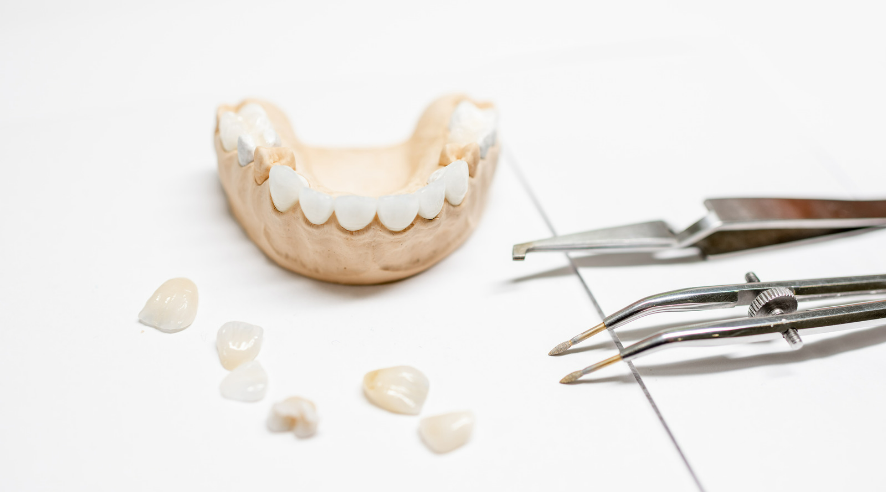The Complete Guide to Dental Veneers: A Lifehack for Perfect Teeth
- 15 September 2022

A smile is the universal language of kindness, but what if you are too self-conscious to show your teeth? Stained, chipped, or misaligned teeth can make you feel insecure and affect your self-esteem. Luckily, modern dentistry has a solution for these issues: dental veneers. Dental veneers are thin shells of porcelain or composite resin that are bonded to the front surface of your teeth. They can improve the appearance of your teeth by changing their color, shape, size, or length, and give you the confidence to smile again. In this article, we will cover everything you need to know about dental veneers, from the types and cost to the benefits and risks. Whether you want to fix a single tooth or transform your entire smile, dental veneers can be a lifehack for perfect teeth.
Types of dental veneers
There are two main types of dental veneers: porcelain and composite resin. Porcelain veneers are the most popular and durable option. They are made of a thin layer of porcelain that is custom-fitted to your teeth and bonded to them with dental cement. Porcelain veneers are known for their natural-looking and long-lasting results, as they resist stains and mimic the translucency and texture of real teeth. However, they are also the most expensive and irreversible option, as they require the removal of a thin layer of enamel from your teeth and take at least two visits to complete.
Composite resin veneers, on the other hand, are a more affordable and conservative option. They are made of a tooth-colored composite material that is applied directly to your teeth and shaped and polished to match the desired look. Composite resin veneers can fix minor cosmetic issues, such as chips, gaps, or discolorations, and be done in a single visit. However, they are less durable and prone to chipping, staining, or discoloration over time. Moreover, they may not match the exact color or texture of your natural teeth.
Cost of dental veneers
The cost of dental veneers depends on several factors, such as the type, the number, the location, and the expertise of the dentist. Porcelain veneers are generally more expensive than composite resin veneers, as they require more time, materials, and skill to make and place. The cost of porcelain veneers can range from $1,000 to $2,500 per tooth, or more, depending on the complexity and the location of the treatment. Composite resin veneers are usually less expensive, with an average cost of $250 to $1,500 per tooth. However, they may require more frequent maintenance or replacement than porcelain veneers.
Benefits of dental veneers
Dental veneers offer many benefits beyond their cosmetic appeal. They can also improve your oral health, function, and comfort. Here are some of the benefits of dental veneers:
- Whiten your teeth: Dental veneers can cover up yellow or stained teeth that cannot be improved by whitening treatments. They can give you a brighter and more youthful smile that boosts your confidence and social life.
- Correct misaligned teeth: Dental veneers can make your teeth look straighter and more aligned without the need for braces or Invisalign. They can also correct minor bite issues that cause discomfort or TMJ syndrome.
- Strengthen your teeth: Dental veneers can reinforce your teeth and protect them from further damage or decay. They can also prevent sensitivity or pain caused by exposed roots or cracks.
- Restore your chewing ability: Dental veneers can improve your bite and help you chew and speak properly. They can also prevent food from getting stuck between
Points and discuss potential risks and aftercare
- Long-lasting results: Dental veneers can last for 10 to 20 years, or even longer with proper care and maintenance. They are resistant to stains, wear, and discoloration, and provide a natural-looking and comfortable fit.
- Versatile application: Dental veneers can be applied to a single tooth or multiple teeth, depending on your needs and goals. They can also be combined with other dental treatments, such as teeth whitening, orthodontics, or implants, to achieve a complete smile makeover.
- Customizable design: Dental veneers can be customized to match your facial features, personality, and lifestyle. You can choose the shape, size, shade, and texture of your veneers to create a unique and flattering look that suits you.
However, dental veneers also have some risks and limitations that you should be aware of before deciding to get them. Some of the risks of dental veneers include:
- Tooth sensitivity: Some patients may experience temporary or permanent sensitivity to hot or cold foods and beverages, or pressure on their teeth, after getting veneers.
- Gum irritation: If the veneers are not properly placed or adjusted, they may cause gum inflammation or recession, which can lead to further dental problems.
- Tooth damage: The removal of enamel from your teeth may weaken them and make them more prone to cracking or breaking. Moreover, if a veneer falls off or gets damaged, it may expose your natural tooth to decay or infection.
- Maintenance and replacement: Dental veneers require regular cleaning and maintenance to prevent decay, staining, or other issues. They may also need to be replaced or repaired after a certain period of time, depending on the wear and tear.
- To minimize the risks and maximize the benefits of dental veneers, you should follow some basic aftercare tips, such as:
- Brush and floss your teeth daily: Use a soft-bristled toothbrush and non-abrasive toothpaste to clean your teeth and veneers twice a day, and floss at least once a day to remove any food particles or plaque.
- Avoid hard or sticky foods: Do not bite or chew on hard or sticky foods, such as ice, hard candy, or popcorn kernels, as they can damage your veneers or natural teeth.
- Visit your dentist regularly: Schedule regular checkups and cleanings with your dentist to monitor the condition of your veneers and address any issues early on.
- Wear a mouthguard: If you play sports or grind your teeth, wear a mouthguard to protect your veneers and natural teeth from damage.
Conclusion
Dental veneers are a popular and effective lifehack for achieving perfect teeth and a confident smile. They offer a wide range of benefits, such as whitening, aligning, strengthening, and restoring your teeth, and can be customized to your preferences and needs. However, they also have some risks and limitations that require careful consideration and aftercare. By understanding the types, cost, benefits, risks, and aftercare of dental veneers, you can make an informed decision about whether they are the right solution for you. Remember, a smile is the best accessory you can wear, so invest in it wisely and enjoy the lifehack of perfect teeth!




